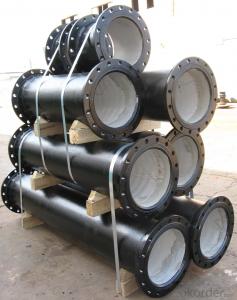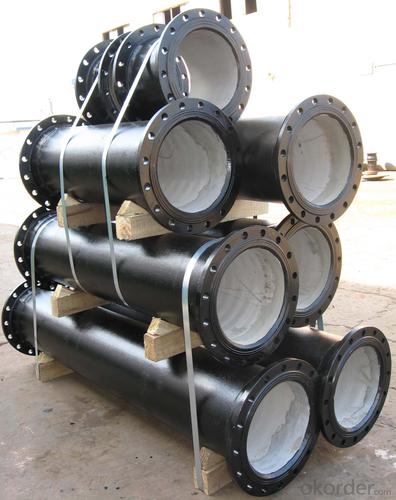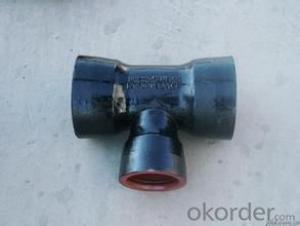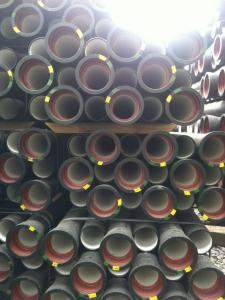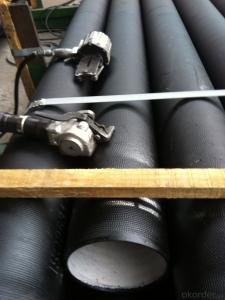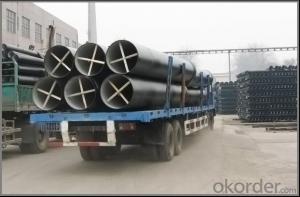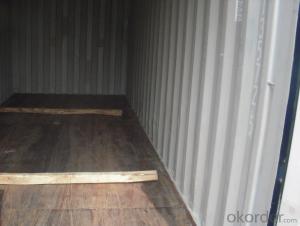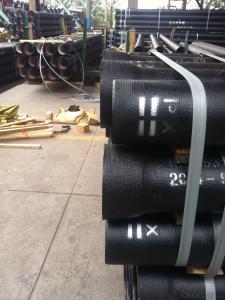D.I PIPE FITTINGS K12 CLASS DN350 FLANGED
- Loading Port:
- Tianjin
- Payment Terms:
- TT OR LC
- Min Order Qty:
- 25 m.t
- Supply Capability:
- 30000 m.t/month
OKorder Service Pledge
OKorder Financial Service
You Might Also Like
Material : Ductile Cast Iron
Size Range : DN 80mm to DN 2000mm
Unit Effective Length : 6m or 5.7m
Manufacture Standard: ISO 2531:1998/ EN 545:2006/EN 598:2007
Annual capacity : 200,000 tons
Coating Exterior: Zinc 130g/m2 according to ISO 8179-1 and bitumen coating 70 microns.
Cement Interior: Portland Cement/ High Alumina Cement/ Sulphate Resisting Cement Lining according to ISO 4179
Special requirements on external coating and internal lining can be applied
We also provide accessories such as SBR/EPDM rubber gaskets, lubricant paste, pipe caps, PE sleeves, etc.
Additional Parts:
Each pipe is strictly inspected according to related standard to ensure permanently high performance.
Easy Installation at site and service free for life
Long Service Lifespan
Quotation will arrive you within 24hours once we get your inquiry.
We guarantee offering you a competitive price.
A copy of original inspection reports of pipes will be offered after shipment.
Photos of loading process will be sent to the customer after shipment effect.
We will follow-up the delivery progress after shipment effect and update to the customer on weekly basis.
- Q: Are ductile iron pipes resistant to impact damage?
- Ductile iron pipes are known for their exceptional strength and durability, making them highly resistant to impact damage. Due to their unique composition, which includes a higher percentage of carbon and silicon, ductile iron pipes possess excellent toughness and flexibility. This allows them to withstand external forces and impacts, such as heavy construction equipment or accidental impacts during installation or maintenance activities. Additionally, ductile iron pipes have a high resistance to cracking and fracturing, further enhancing their ability to withstand impact damage. However, it is important to note that while ductile iron pipes are highly resistant to impact damage, they are not completely immune. Extreme or repeated impacts may still cause damage, albeit to a lesser extent than other types of pipes. Regular inspections and maintenance are crucial to identifying and addressing any potential impact damage to ensure the long-term integrity and performance of ductile iron pipes.
- Q: What are the typical pressure surge protection measures for ductile iron pipe?
- To ensure the integrity and longevity of ductile iron pipe, various measures are commonly employed to protect against pressure surges. These measures encompass the following: 1. Surge tanks serve as effective tools for absorbing and mitigating the impact of pressure surges on ductile iron pipe. These tanks are typically positioned strategically at critical points in the pipeline system, such as near valves or pump stations, providing a reservoir to contain excess pressure. 2. Air release valves are indispensable components within ductile iron pipe systems, serving the purpose of releasing trapped air and preventing the formation of air pockets. These valves maintain a stable pressure within the pipe, reducing the risk of pressure surges during operation or abrupt changes in flow. 3. Pressure relief valves are designed to safeguard ductile iron pipes by releasing excessive pressure when it surpasses a predetermined threshold. These valves are usually installed at strategic locations in the pipeline system and programmed to open when the pressure exceeds a safe limit, diverting the excess pressure to safeguard the pipe from damage. 4. Surge suppressors are devices installed in ductile iron pipe systems to absorb and dissipate pressure surges. These devices function as shock absorbers, lessening the impact of pressure fluctuations and protecting the pipe from harm. Surge suppressors are particularly effective in situations where pressure surges occur frequently or are severe. 5. Ensuring an appropriate pipe wall thickness is another critical measure for pressure surge protection in ductile iron pipe. By selecting a pipe with the correct wall thickness, engineers can guarantee the pipe's ability to withstand the pressure surges it may encounter during operation. This measure helps prevent pipe failure or rupture caused by excessive pressure. It is essential to note that the specific pressure surge protection measures employed for ductile iron pipe may vary depending on factors such as the application, pipe size, operating conditions, and regulatory requirements. Consulting experts in pipeline engineering and design is imperative to determine the most suitable pressure surge protection measures for a particular ductile iron pipe system.
- Q: How do ductile iron pipes handle water velocity?
- Ductile iron pipes are capable of handling high water velocities due to their inherent strength and durability. The material's flexibility enables it to withstand the force and pressure created by fast-moving water, making it suitable for applications where high water velocity is a concern.
- Q: Can ductile iron pipes be used for geothermal energy systems?
- Yes, ductile iron pipes can be used for geothermal energy systems. Ductile iron pipes are known for their strength, durability, and resistance to corrosion, making them suitable for various applications, including geothermal energy systems. They can effectively handle the high pressures and temperatures associated with geothermal energy production, making them a reliable choice for transporting hot water or steam. Additionally, ductile iron pipes have a long lifespan, reducing maintenance and replacement costs for geothermal energy systems.
- Q: Qianwei County ductile iron pipe which tool to use cutting convenience?
- The cutting of ductile iron pipes is usually done by mechanical cutting, and the working intensity of the machine is stronger than that of our normal workers. This cutting method can effectively reduce the labor intensity of workers, and ensure the quality of cutting. There are many different ways in mechanical cutting, such as sawing, grinding, cutting, and cutting with an electric wire cutter.
- Q: Can ductile iron pipes be used in contaminated soil conditions?
- Yes, ductile iron pipes can be used in contaminated soil conditions. Ductile iron is known for its strength and durability, making it resistant to corrosion and damage from external factors such as soil contaminants. Additionally, ductile iron pipes have been successfully used in a variety of challenging environments, including contaminated soils, where they can provide reliable and long-lasting underground infrastructure for the transportation of water and other fluids.
- Q: Are ductile iron pipes suitable for gravity flow applications?
- Yes, ductile iron pipes are suitable for gravity flow applications. Ductile iron pipes have high strength and durability, making them ideal for carrying fluids under gravity. They can withstand the pressure and weight of fluid flow without the need for additional support or reinforcement. Additionally, ductile iron pipes have excellent corrosion resistance, which ensures their long-term performance in gravity flow systems.
- Q: How are ductile iron pipes tested for quality assurance?
- To guarantee the quality and adherence to industry standards of ductile iron pipes, a variety of testing procedures are carried out. These tests evaluate both the raw materials and the finished products, aiming to ensure the pipes' durability, strength, and overall reliability. The first step involves analyzing the chemical composition of the raw materials used in the manufacturing process. This analysis verifies that the iron, carbon, and other elements fall within the specified range, as different compositions can impact the pipes' strength and resistance to corrosion. Next, mechanical tests assess the pipes' strength and ductility. Tensile tests determine properties like ultimate tensile strength, yield strength, and elongation, which help assess the pipes' ability to withstand external pressure and bending forces. Moreover, impact tests measure the pipe's ability to resist sudden loading or impact. By evaluating the energy absorbed by the pipes under high impact force, these tests ensure that the pipes can endure accidental impacts during installation or operation. Another pivotal test is the hydrostatic pressure test, which examines the pipes' capacity to withstand internal pressure. By subjecting the pipes to a specific pressure for a designated duration while filled with water, this test ensures their capability to handle expected operating pressures without any leakage or failure. Furthermore, dimensional and visual inspections are conducted to verify that the pipes meet the required specifications. These inspections involve checking the outer diameter, length, wall thickness, and overall appearance for any defects, such as cracks, voids, or irregularities. Lastly, corrosion resistance tests evaluate the pipes' ability to resist corrosion when exposed to different environments or fluids. These tests help determine the pipes' expected lifespan and their suitability for various applications. In conclusion, these quality assurance tests are vital in ensuring that ductile iron pipes adhere to the necessary standards and deliver dependable, long-lasting performance in diverse infrastructure projects.
- Q: Can ductile iron pipes be used in dam or reservoir projects?
- Ductile iron pipes are highly suitable for dam or reservoir projects. Their strength, durability, and resistance to corrosion are well-known, making them a preferred choice for a range of applications, such as water distribution and transmission systems. In projects involving dams or reservoirs, where the pipes must endure high pressure and transport large volumes of water, ductile iron pipes are often the top choice. Their exceptional mechanical properties, including impressive tensile strength and impact resistance, guarantee their ability to handle the load and offer a dependable and long-lasting solution. Moreover, ductile iron pipes can easily adapt to various installation methods, including trenchless techniques, making them a versatile option for dam or reservoir projects.
- Q: Are ductile iron pipes suitable for use in oil refineries?
- Yes, ductile iron pipes are suitable for use in oil refineries. Ductile iron is a type of cast iron that offers a unique combination of strength, durability, and flexibility, making it an excellent choice for various applications, including oil refineries. One of the key advantages of ductile iron pipes is their high tensile strength, allowing them to withstand the high pressure and stress commonly found in oil refining processes. This strength is crucial for the transportation of various fluids, including crude oil, refined petroleum products, and chemicals within the refinery. Additionally, ductile iron pipes have excellent corrosion resistance properties, making them highly resistant to the corrosive effects of oil, chemicals, and other substances typically present in oil refineries. This corrosion resistance ensures the longevity and reliability of the pipes, reducing the need for frequent maintenance and replacement. Furthermore, ductile iron pipes have exceptional ductility, which means they can absorb and withstand significant impacts and vibrations without fracturing or breaking. This quality is advantageous in oil refineries where there may be frequent movement or potential stressors due to machinery, equipment, or ground settlement. Moreover, ductile iron pipes have a smooth interior surface that reduces friction, allowing for efficient fluid flow and minimizing pressure loss. This characteristic is essential in oil refineries, as it helps optimize the transportation of fluids, ensuring a smooth and reliable production process. In conclusion, ductile iron pipes are suitable for use in oil refineries due to their high tensile strength, corrosion resistance, ductility, and smooth interior surface. These pipes provide a reliable and durable solution for transporting various fluids within the refinery, contributing to the efficient and safe operation of oil refining processes.
Send your message to us
D.I PIPE FITTINGS K12 CLASS DN350 FLANGED
- Loading Port:
- Tianjin
- Payment Terms:
- TT OR LC
- Min Order Qty:
- 25 m.t
- Supply Capability:
- 30000 m.t/month
OKorder Service Pledge
OKorder Financial Service
Similar products
Hot products
Hot Searches
Related keywords
